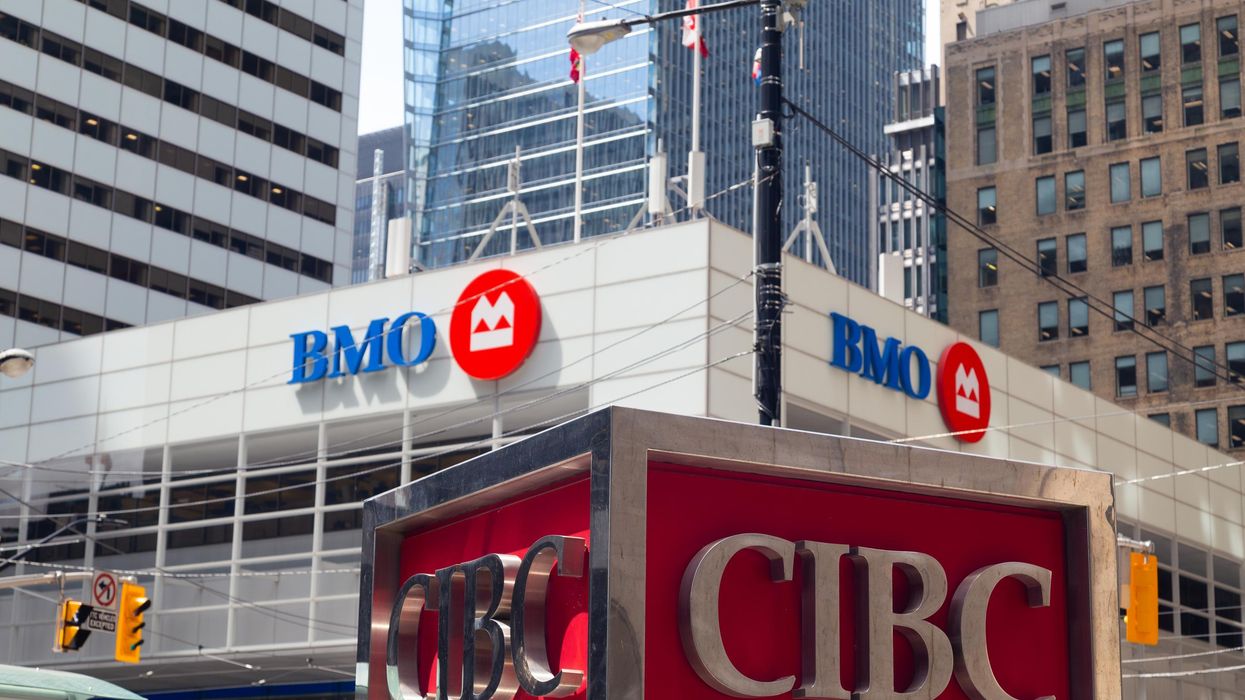Here's How To 'Recession-Proof' Your Life In Canada, According To A Financial Expert
Experts predict a recession might already be underway in Canada.👇

A BMO and A CIBC sign in Toronto's financial district.
As everything from groceries to furniture continues to get more expensive, you might find yourself wondering how to save money in Canada's current climate.
Well, it's a good question, especially as some experts predict a recession in Canada might already be underway.
These fears are connected to the Bank of Canada possibly announcing another increase rate hike on Wednesday, October 26.
Narcity spoke with Lisa Hannam, the Executive Editor of MoneySense.com, to get a good idea of where we're heading, what a recession really means, and what you can do to "recession-proof" yourself.
What is a recession?
This is an important concept to understand before we figure out how to prepare for it.
Simply put, "a recession is defined as two consecutive quarters of negative growth in gross domestic product," explained Hannam.
"However, every recession is different because of the economic issues that cause the downturn."
Will Canada have a recession?
While the future is unknowable, Hannam does point to a number of organizations that are predicting, or preparing for, a recession in 2023.
These include the Canadian Mortgage and Housing Corporation, which says that "Canada's economy will enter a 'modest' recession by the end of 2022 but we will start to see that improve in the second half of 2023."
Hannam does point out that, "It’s not a question of if and when [a recession will happen], but how Canadians can prepare for the next 12 to 18 months."
Who will be most affected by a recession?
Interest rates and inflation will affect all Canadians in some respect, no matter what industry you're in or place you live, meaning Canucks will likely have less cash for non-essential things.
This means that the industries of "travel, tourism, retail, restaurants, real estate, manufacturing, oil and energy, technology and so on" are the most vulnerable to a recession.
How can you recession-proof your life?
According to Hannam, "recession-proofing is about being prepared."
"It’s important to be realistic about your financial situation," she explained. "And that includes how your job could fare in a recession, and what rising costs will mean for you and your family."
"That means asking yourself how prepped you are for a worst-case scenario."
Hannam recommends that you set up an emergency fund for exactly what you'd expect – emergencies.
"Saving about 3 to 6 or even 12 months of expenses is a great strategy to be able to handle a job loss, medical leave, increase in non-discretionary expenses (housing, groceries, etc.), and so on," she said.
Additionally, she added that now would be a great time to "check in on your portfolio."
"It is very important to ensure that your investments are diversified to withstand volatility and perform well over the long run."
You should also check on your budget and expenses, and give them a new assessment.
"Give yourself an evening to go over incoming and outgoing money, without leaving a penny unturned," said Hannam.
From credit cards and transportation, to food and electricity, double-check everything to make sure it is where you want it to be.
"You can do this with a pen and paper, a spreadsheet or an app," she added.
Ultimately, it could also mean looking at some different goals for the coming year, such as delaying a trip or house purchase or planning a smaller wedding.
Keep the long term in mind and always remember: "Don’t panic and make short-sighted changes to your financial situation."
This article's cover image was used for illustrative purposes only.